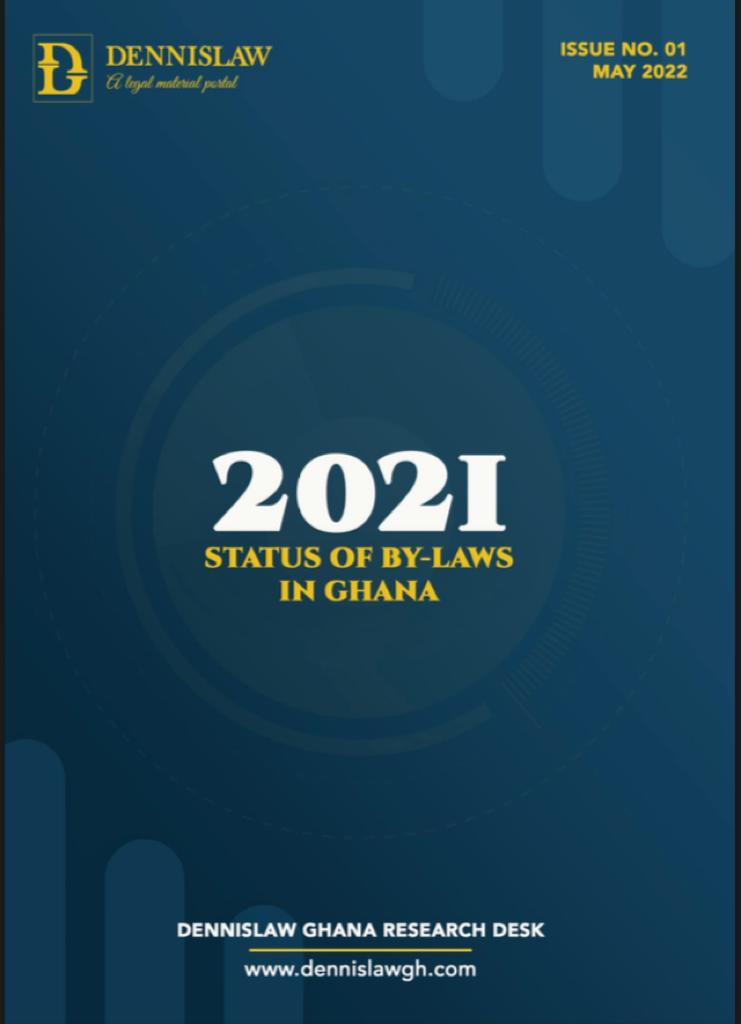59% of MMDAs in Ghana operating without by-laws - Report
Research by Dennislaw in partnership with the Corporate Secretarial and Training Services(CSTS) has revealed that a total of 155 MMDAs in Ghana are operating without by-laws.

You might be wondering how a political unit like District Assemblies can carry out their overall development, including the promotion of local economic development, basic education and public health, environmental protection and sanitation, and the improvement and management of human settlements without by-laws.
This is more than a reality as it has emerged that out of the total of two hundred and sixty-one (261) MMDAs in Ghana, only one hundred and six(106) representing forty-one percent(41%) have by-laws, leaving a chunk of one hundred and fifty-five (155) which makes up some fifty-nine percent ( 59%) operating without by-laws.
Notwithstanding, these MMDAs continue to grant permits, issue fees, charges, penalties, and others, which raises the pertinent question of the legality of these acts and activities of the MMDAs.
Research by Dennislaw in partnership with the Corporate Secretarial and Training Services(CSTS) dubbed; 2021 STATUS OF BY-LAWS IN GHANA has revealed the above situation and more.
FINDING
In all, the Ashanti Region has the highest number of MMDAs operating without by-laws thus twenty-six ( 26), followed by the Eastern Region having eighteen (18) MMDAs.
The rest are Greater Accra and Central Regions with fifteen (15) MMDAs appease.
Additionally, Regions like Bono, Bono East, North East, Oti, Upper East, Upper West, and Western Region have more than fifty percent (50%) of their entire number of MMDAs not operating with by-laws.
In the 25-page research finding, it has further emerged that one hundred and eight (108) sets of by-laws have been gazetted in respect of one hundred and nine (109) MMDAs.
Also, three sets of by-laws (Kintampo, Assin Fosu Municipal, and Mamprusi) could not be considered valid by virtue of the redefinition of their areas of jurisdiction.
DRAFT BY-LAW
A total of twenty-seven (27) MMDAs from eight (8) regions were identified as using draft by-laws.
However, per the strict requirement of Section 182 of the Local Government Act, 2016(Act 936), these MMDAs were not considered to have valid by-laws because draft by-laws are by-laws that even though have been accepted by their local Assemblies and received approval from the Regional Coordinating Council, are yet to be gazetted or published.
Section 182 of the Local Government Act, 2016 (Act 936), imposes a strict procedural regime on all MMDAs to adopt by-laws for their operation. It states that;
(1) Every by-law made by a District Assembly shall be submitted to the Regional Co-ordinating Council.
(2) The Regional Co-ordinating Council shall ensure that the by-law is consistent with this Act or any other enactment.
(3) Where the Regional Co-ordinating Council
(a) rejects the by-law, the Regional Co-ordinating Council shall notify the District Assembly giving reasons for the rejection; or
(b) approves the by-law, the Regional Co-ordinating Council shall cause the by-law to be published.
Sub-Section 4 makes a very important and striking demand of the MMDAs which is that;
(4) A by-law shall not have effect until the by-law has been
(a) posted on the premises of the District Assembly concerned and in at least one other public place within the district, and
(b) published in a daily newspaper of national circulation or in the Gazette.
About the Research
The research sought to examine the level of compliance among the Metropolitan, Municipal, and District Assemblies (MMDAs), specifically Section 182(4) of the Local Government Act, 2016(Act 936) which requires all enacted by-laws to be published or gazetted in order to be declared valid.
The research collected data primarily from the Ghana Publishing Company Limited(Assembly Press), which is the sole institution with the responsibility to gazette by-laws in the country.
Further to the above, newspaper publications relating to by-laws were examined as well the support of a number of MMDAs was solicited for the validation of the data collected.
Find the full report below;


